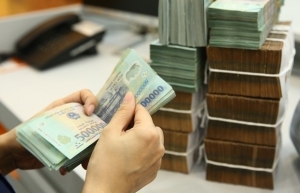Rising bad debt putting brakes on lending by financial firms
 |
| Rising bad debt putting brakes on lending by financial firms, illustration photo/ Source: freepik.com |
Nguyen Quoc Hung, secretary-general of the Vietnam Banks Association (VBA) expressed concern last week about the increasing challenges faced by these financial institutions, primarily due to the surge in non-performing loans (NPLs).
He attributed this troubling trend to both objective economic difficulties and, more alarmingly, subjective factors like intentional defaulting by customers.
“There are instances where company staff face resistance, false accusations, and even legal complaints when attempting to collect debts,” Hung explained at a seminar on consumer finance.
The current situation has led to a spike in bad debts for consumer finance companies, with NPLs ranging 8-10 per cent and, in some cases, as high as 20 per cent.
“Many companies are struggling, some even facing losses due to the necessity of provisioning for these increasing risks,” Hung added.
As of September, the outstanding loans for living expenses across the entire banking system accounted for around 21 per cent of the total outstanding loans in the economy.
The debts incurred by 16 financial companies for consumer purposes amounted to around $5.7 billion, representing over 5 per cent of the total loans for living expenses.
In addition to these challenges, Le Quoc Ninh, CEO of MB Shinsei Financial Company, emphasised the severe impact on business operations caused by the misconstruction of licensed financial companies as illegal credit organisations.
“Despite state authorisation, the beneficial value of these 16 consumer finance companies is being diluted by the invasion of hundreds of unregulated credit institutions, commonly known as black credit. The proliferation of deceptive consumer lending apps has further distorted public perception,” Ninh said.
He also cited a report by FiinGroup, indicating a rise in NPLs among financial companies from 10.7 per cent at the end of 2022 to 12.5 per cent within the first half of 2023.
In addressing these issues, Ninh proposed fundamental solutions, including economic revitalisation policies, and monetary and fiscal strategies to support businesses and citizens, thereby aiding the recovery of the consumer market. He also called for enhanced communication by authorities about legitimate consumer credit, clearly distinguishing it from illegal lending.
“Local governments should support financial companies in debt collection, ensuring access to customers for constructive solutions, rather than employing prohibitive or negative measures. Debt recovery by these companies is significantly restricted compared to banks since lending is based entirely on trust and the borrower’s repayment commitment, without any collateral,” he noted.
Ninh also urged the State Bank of Vietnam (SBV) to refine regulations to better fit the unique operational characteristics of consumer finance companies.
“This includes establishing a legal framework for professional debt collection services, currently prohibited in Vietnam, but well-regulated in other countries,” he said. “Additionally, the SBV should also consider a separate NPL threshold for consumer finance companies, acknowledging their distinct nature and client base of medium to low-income earners with unstable income.”
With the rising bad debt, numerous financial firms are unable to expand lending, severely impacting low-income earners and those in hardship who cannot access consumer finance, Hung of the VBA explained. This restriction has inadvertently fuelled the growth of unlicensed lending networks.
Despite aggressive crackdowns, these entities continue to evolve, particularly online. “The tight credit market is directly contributing to the rise of black credit services, which cleverly adapt to elude detection,” Hung stated.
Highlighting the severity and complexity of the issue, Major Nguyen Ngoc Son from the Criminal Police Department under the Ministry of Public Security said that in the last four years, 89 cases and 434 individuals have been prosecuted for involvement in black credit, often utilising high-tech means and targeting vulnerable populations like small business owners and low-income workers.
Son called for increased public awareness and banking collaboration to counter this emerging financial peril. “Awareness campaigns are crucial for helping the public recognise fake financial services,” he said.
He advocated for a joint approach between banks and law enforcement to authenticate borrower information using national demographic data, with the aim to minimise fraudulent borrowing.
“It’s essential to expedite the approval of collateral-free loans based on verified personal data,” Son said. “Additionally, banks have been urged to cooperate with the police by sharing intelligence on illegal lending activities. Timely reporting from banks is critical in combating the negative impacts of shadow lending on legitimate credit operations.”
 | Banking sector focuses on credit institution restructuring associated with bad debt settlement The banking sector should take more drastic measures to restructure credit institutions in association with the settlement of bad debts to contribute to curbing inflation and stabilising macro-economic factors, according to insiders. |
What the stars mean:
★ Poor ★ ★ Promising ★★★ Good ★★★★ Very good ★★★★★ Exceptional
Related Contents
Latest News
More News
- Banking sector targets double-digit growth (February 23, 2026 | 09:00)
- Private capital funds as cornerstone of IFC plans (February 20, 2026 | 14:38)
- Priorities for building credibility and momentum within Vietnamese IFCs (February 20, 2026 | 14:29)
- How Hong Kong can bridge critical financial centre gaps (February 20, 2026 | 14:22)
- All global experiences useful for Vietnam’s international financial hub (February 20, 2026 | 14:16)
- Raised ties reaffirm strategic trust (February 20, 2026 | 14:06)
- Sustained growth can translate into income gains (February 19, 2026 | 18:55)
- The vision to maintain a stable monetary policy (February 19, 2026 | 08:50)
- Banking sector faces data governance hurdles in AI transition (February 19, 2026 | 08:00)
- AI leading to shift in banking roles (February 18, 2026 | 19:54)

 Tag:
Tag:



















 Mobile Version
Mobile Version